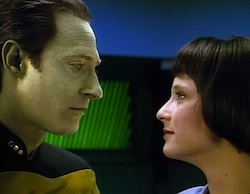Housekeeping note: This week’s Tuesday-Friday schedule is now the new norm. Moving forward, new installments of the TNG Rewatch will appear mid-day every Tuesday and Friday. We’ll have “Sins of the Father” on Tuesday and “Allegiance” on Friday. Please adjust your lives accordingly…
“The Offpsring”
Written by Rene Echevarria
Directed by Jonathan Frakes
Season 3, Episode 16
Production episode 40273-164
Original air date: March 12, 1990
Stardate: 43657.0
Captain’s Log: Data, after attending a cybernetics conference, spends every spare moment in the lab. After several weeks, he unveils what he’s been working on to La Forge, Troi, and Wes: a child named Lal (the Hindi word for “beloved”). Data has been able to do what only Noonien Soong had been able to accomplish previously.
Picard is apprehensive to say the least, precisely because this is so momentous. His initial complaint is that Data did not consult him. Data, justifiably, points out that he has not observed other members of the crew consulting the captain on their procreation.
Data wishes his child to choose gender and form, and Lal decides to appear as a human female. She learns quickly, and with each neural transfer Data makes from his own brain her abilities and philosophical inquiries improve and increase. Data tries sending her to school, but that doesn’t entirely work as she is not well enough socialized for the older children and too advanced for the younger ones.
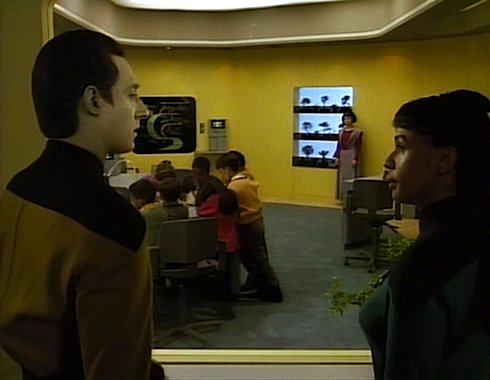
Starfleet Command, in the person of Admiral Haftel, is concerned that the Enterprise isn’t the right atmosphere for the new android, and that Data’s presence might well retard her development. Haftel comes to the Enterprise to inspect Lal and to see if she should remain on board (though it’s a show, really—he has no intention of doing anything other than take her). Picard does not feel that he can just order Lal away from her father, as androids are sentient beings with rights that he himself helped define.
Since school isn’t working, Data has Lal work with Guinan in Ten-Forward. It’s a good place to observe humanity. She learns about holding hands and kissing, to sometimes comic effect—but when she realizes that she is different from everyone around her, she questions why Data continues to try to be more human when he can’t be. He says that he’s struggled with that question all of his life. She then holds his hand. (She also uses contractions, something Data has never mastered.)
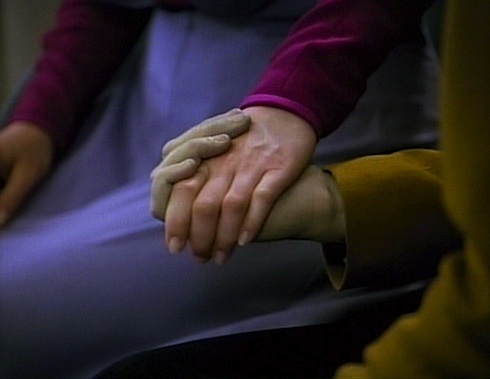
Haftel interviews Lal, making it clear that she’s to come to the Daystrom Annex on Galor IV with him—and without Data. Lal has no desire to do so, and Picard asks her what she wants.
She says she wishes to stay on board with her father, at which point Picard excuses her. She goes to Troi, because she is feeling emotions: fear at being taken away from her father.
Haftel then talks to Data, who refuses to volunteer to release her to the admiral. She is his daughter, and to give her up would violate every tenet of human parenting he has learned. So Haftel orders Data to turn her over, which, of course, he follows —
— until Picard belays the order. He will not allow Haftel to break up the family.
However, before Picard and Haftel can argue about it further, Troi calls Data in a panic. Lal is malfunctioning—though that malfunction is emotional awareness. Unfortunately, it’s also a symptom of a cascade failure. With Haftel’s help, Data tries to repair her, but every time Data attempts to fix a pathway, another one breaks down. There’s nothing to be done. Lal’s final words are that she loves her father.
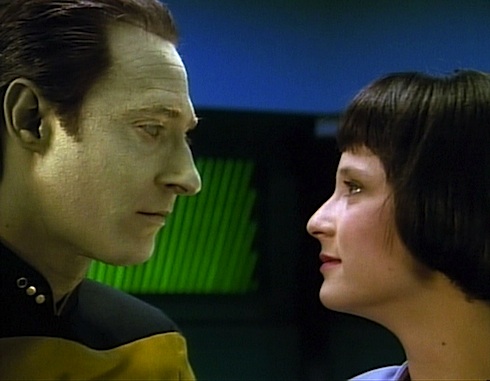
Data incorporates Lal’s memories back into his own positronic brain, so she will live on, in a manner of speaking.
Can’t We Just Reverse the Polarity?: A new sub-micron matrix transfer technology enabled Data to transfer his positronic brain into another android.
Thank You, Counselor Obvious: Troi refuses to play along with Picard’s initial reluctance to think of Lal as a child, pointing out that Data is a father and Lal is his daughter, no matter how different it might be from the human method of procreation. To his credit, Picard comes around to this notion fairly quickly, but it’s to Troi’s credit that she’s already there from jump.
If I Only Had a Brain…: Data creates what he thinks is only the third Soong-type android after himself and Lore (since he’s not yet aware of Julianna Tainer and B-4, who will be revealed to him in “Inheritance” and Star Trek Nemesis, respectively) and the only other one still active (since he believes Lore to be lost after the events of “Datalore“; he’ll learn the error of that belief in “Brothers”). He is aware of his unique place in the universe, and is concerned that, if something should happen to him, he will be lost. By reproducing, he ameliorates that concern. (Haftel throws that argument back in his face later on by telling Data that having the only two Soong-type androids be on the same ship, one that gets into firefights and stuff, might not be such a hot idea.)
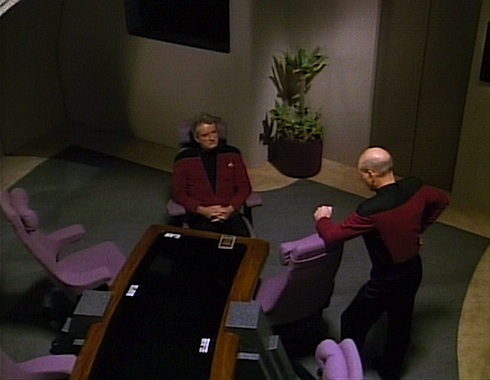
The Boy!?: When Wes was a child, he had trouble fitting in that was very similar to what Lal goes through. Crusher shares this with Data to help him figure out how to deal with Lal’s problems.
Syntheholics Anonymous: Guinan provides useful guidance to Lal in interpersonal interactions during the latter’s brief tenure as a waitress. She also does a mediocre job of trying to convince Haftel that it’s a good idea. (“Come on, Admiral—you’ve been in a few bars yourself”—not exactly a comment designed to get on Haftel’s good side…)
No Sex, Please, We’re Starfleet: Having just learned about kissing from Guinan (who had to correct Lal’s misapprehension that two humans were biting each other), Lal decides to give it a shot by kissing Riker (who has just come back on board after personal leave and doesn’t know about Lal). Data walks in on her kissing the first officer and asks what his intentions are toward his daughter. The look on Riker’s face when he exclaims, “Your daughter!?” is priceless. (Since this was Frakes’s first time directing, Riker’s screen time was limited to only two scenes, but he certainly made the most of that one.)
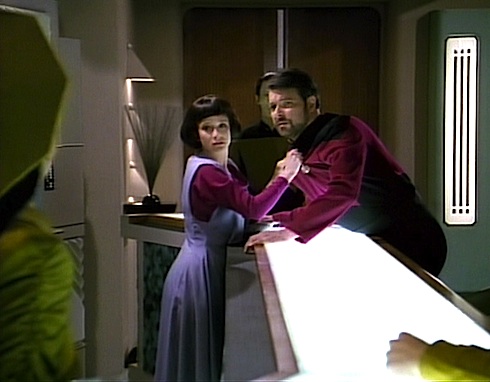
I Believe I Said That: “There are times, sir, when men of good consicence cannot blindly follow orders. You acknowledge their sentience, but ignore their personal liberties and freedom. Order a man to turn his child over to the state? Not while I am his captain.”
Picard to Haftel when the latter tries to order Data to turn Lal over to him.
Welcome aboard. Nicolas Coster is fairly inadequate as Haftel—honestly, his portrayal is one of the episode’s few flaws.
However, the episode is made by Hallie Todd, who is simply fantastic as Lal. She modulates impressively from awkward to capable. Given less than 40 minutes to show Lal’s evolution and emotional collapse, she accomplishes it magnificently, being utterly convincing at every stage from the difficult beginning to the accomplished middle to the tragic end.
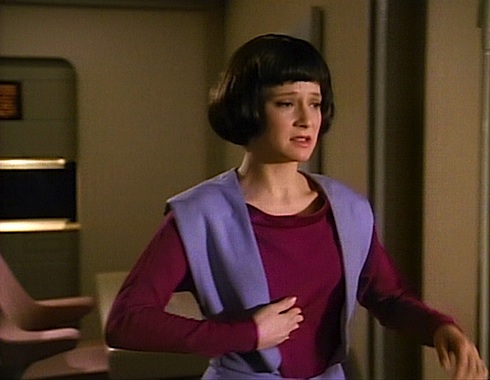
Trivial Matters: This is the first script by Rene Echevarria who, like Ronald D. Moore before him, sold it as a spec script and parlayed it into a staff position. Echevarria would remain on staff for the rest of TNG‘s run and, like Moore, move on to Deep Space Nine. He’s since worked on The 4400, Now and Again, Dark Angel, Medium, and Castle, among others, and is currently an executive producer of Terra Nova (working alongside Brannon Braga, who also got his start on TNG).
It’s also the first directorial endeavor by Frakes, and also the first time that a cast member of a Trek TV show has directed an episode of a Trek show. (He’s the third cast member to direct any kind of Trek endeavor, after Leonard Nimoy and William Shatner.) His effort was groundbreaking, as “The Offspring” broke the dam, and several other Trek actors have would go on to become directors (Patrick Stewart, LeVar Burton, and Michael Dorn among his castmates, as well as several actors from DS9 and Voyager). Frakes himself has gone on to become a top TV director.
This episode is a sequel of sorts to “The Measure of a Man.” In that episode, Picard established android’s rights within Starfleet, but—as, for example, former slaves during the Reconstruction era in the U.S. can attest—passing the law is only the first step. Changing people’s perceptions takes a bit longer.
Make it So: “Why is the sky black?” For the second time this season, Michael Piller picks a winner off the slush pile.
One of the primary complaints about TNG by its detractors (and even sometimes by its fans) is that the characters didn’t really change that much over the seasons. While that argument has merit for some, it most assuredly does not for Data, and this is a prime example. What happens in this episode is obviously shaped by his experiences, both specific (learning his origins in “Datalore,” being officially considered his own person in “The Measure of a Man,” bonding with Sarjenka in “Pen Pals,” possibly even his Q-granted laugh in “Déjà Q” and being flirted with in “The Ensigns of Command“) and in general (serving on a ship with families and children), as a scientific breakthrough enables him to take another step on the road to humanity.
The joy here is less in watching Lal’s development—though that is fun—than in watching Data’s. He learns to be a parent, and gets to experience the joy of discovery that he went through all over again. Spiner beautifully plays it, and puts the lie to the notion (codified in this season) that Data has no emotions. (Though the script itself recognizes this in the person of Crusher who expresses skepticism at Data’s declaration that he can’t feel love for Lal.) In particular, Data’s facial expressions as he helps Lal through various learning processes is delightful.
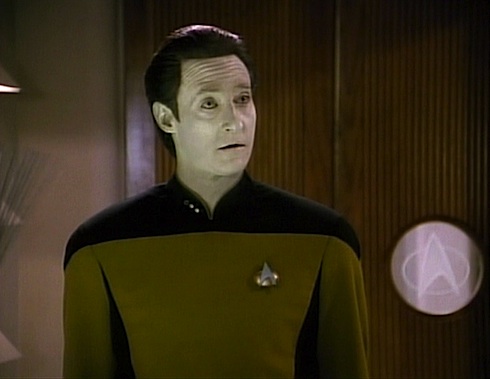
Of less interest is Picard’s arguments with Starfleet, mainly because Haftel is such a straw bad guy, played with minimal conviction by Coster. Some (okay, my housemates while I was watching this) have complained that the episode makes no sense because Picard already established android rights a year earlier. But changing laws doesn’t change attitudes, and there’s still a prejudice against androids, keeping some folks from thinking of them as people (Picard himself has it when he first learns of Lal).
This is an excellent episode, continuing the development of one of the show’s most compelling characters.
Warp factor rating: 9
Keith R.A. DeCandido wrote a conversation between Data and an inspector on the subject of his ability to feel emotions in his novel A Time for War, a Time for Peace, one of his many works of Star Trek fiction. Go to his web site for links to his blog, his Facebook page, his Twitter feed, not to mention ways in which you can buy his incredibly awesome books like the fantastical police procedurals SCPD: The Case of the Claw and Unicorn Precinct.










